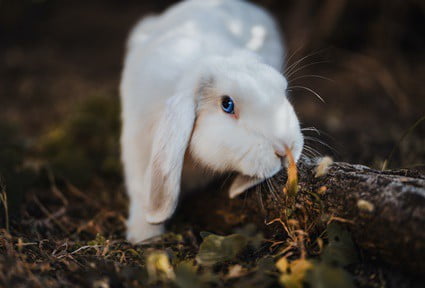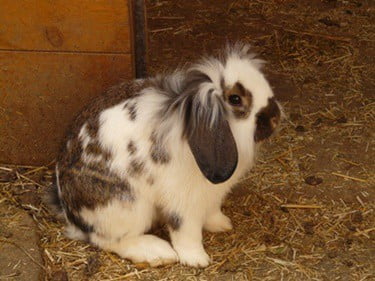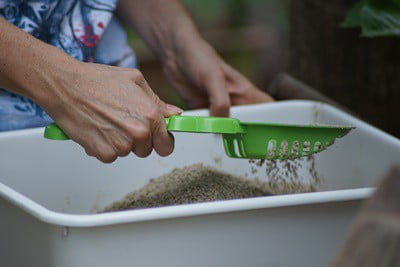If you already have some cat litter on hand, you might be wondering if it’s safe to use for lining your rabbit’s litter tray.
Most cat litters are harmful to rabbits. Litters like clumping, crystal, and clay can cause digestive problems, and even death, in rabbits. However, there are some cat litters made of rabbit-friendly material. These materials consist of paper and natural wood.
Cat litter can be a convenient choice for owners. However, there are materials that you can use as a rabbit litter. Some alternatives to cat litter include newspaper shavings, compressed wood shavings, and hay.
Can You Use Cat Litter for Rabbits?
Cat litter can be harmful to rabbits. Cats and rabbits are different animals, and cat litter is designed with cats in mind, not rabbits. While there are some types of cat litter that rabbits can use, most should be avoided. The common side effects of inappropriate cat litter to rabbits are the following:
Intestinal Blockages
Rabbits tend to eat litter more often than cats. While cats sometimes eat their own litter, this is considered a behavioral issue. In rabbits, this behavior is common and natural. In fact, it should be accounted for when setting up a litter box.
Cat litter is designed without the risk of ingestion in mind. When rabbits use cat litter, they are at risk of ingesting the litter. Most cat litters cause digestive problems when ingested, and sometimes can even lead to death. Any cat litter that contains silica or clay will always put rabbits at risk for intestinal blockages.
Respiratory Issues
Another issue to note is that of respiratory issues. Rabbits have a more sensitive respiratory system than that of cats. Some types of cat litter come with a lot of dust particles, including clay and crystal particles. When breathed in, this dust can cause respiratory issues in rabbits.
Digestive Problems
Other than intestinal blockages, rabbits are also at risk for digestive problems. While relatively minor compared to blockages, digestive problems still put a rabbit’s health at risk.
Cat Litter Types To Avoid
Most cat litters are not safe for rabbits, but there are some that are OK to use. How do you know which types are bad? Here are some types to avoid:
Clumping
All types of clumping cat litter are harmful to rabbits. In fact, it can be one of the most dangerous kinds of litter for your rabbit. When clumping litter absorbs moisture, it can expand up to 15 times in size.
When ingested, clumping litter will expand in the stomach. At best, this will lead to blockages. At worst, this can cause your rabbit’s entire digestive system to shut down. Avoid all types of clumping litter for your rabbit.
Clay
While not as damaging as clumping litter, clay litter is also harmful when ingested. Clay litter can cause digestive issues, as well as blockages. Even if your rabbit does not eat the clay, the dust from this litter can also be harmful. Clay litter can cause respiratory issues when breathed in.

Crystal
While sometimes considered as a safer alternative to other types of cat litter, crystal cat litter can be harmful to rabbits. Of all cat litters, crystal cat litter is the most susceptible to being ingested.
On top of that, crystal cat litter also contains chemicals to keep its crystalline form. Some formulations can be toxic to rabbits when ingested.
Rabbit-Safe Litter
What makes litter rabbit-safe? Here are some things you should consider when looking at a brand or type of litter for your rabbit:
Non-Toxic
Rabbits tend to chew on their litter more often. This is a natural and expected behavior, but inappropriate litters can put your rabbit’s health at risk. To avoid your rabbit from ingesting toxic materials, make sure that your litter is non-toxic as well.
Natural materials may seem like a good choice for non-toxic materials, but not all-natural materials are non-toxic. Instead, do your research on specific materials to determine whether or not they are toxic to rabbits.
High Absorbency
Rabbits will often avoid smelly litter boxes. This can lead to many messes around the house, as well as messy rabbits.
The odor that comes from unclean litter boxes is due to ammonia. Ammonia is released when urine is left in one location without being cleaned out. Therefore, to avoid odors, litters that absorb moisture, more specifically urine, is key.
Chemical-Free
Rabbits should stick to materials in their naturally occurring forms. Again, rabbits tend to chew on their litter. When buying litter, stick to combinations without additions. Any additions and mixtures to these materials to make them more absorbent or easier to clean can pose a risk to rabbits.
Always check the ingredient’s list on a package of litter. If you notice any questionable additions or mixes, do your research to ensure that these additions are rabbit safe.
Safe Rabbit Litter Alternatives
Most cat litters are not rabbit-safe. However, there are some cat litters that you can safely use for rabbits:
Paper
Paper pellets are one of the most recommended litters for rabbits. Paper is naturally non-toxic, chemical-free, and is also biodegradable. Paper is also highly absorbent, making it a good and safe alternative for other types of cat litter. It is also safe when ingested, as it can easily be digested by cats and rabbits alike.
Commercial cat litters that use this material are Purina’s Yesterday’s News, as well as Breeder’s Choice. Both are made with recycled paper on top of being non-toxic and chemical-free. Both are also completely biodegradable.
Natural wood fibers
There’s a good reason why natural wood fibers are the most common materials for rabbit litters. Wood fibers are absorbent, and most of them are safe for rabbits to ingest. Like paper, they are biodegradable too. On top of that, some woods also produce a nice smell that you and your rabbit can appreciate.
The most common woods used in cat litter are pine and cedar. Both woods are aromatic woods that can mask the smell of urine. It is, however, less effective than litters designed to absorb smell and urine.
It should be noted that there are rabbit owners that are reluctant to use wood as litter. There are claims that wood causes liver disease. This is based on how, in the laboratory, scientists avoid softwoods due to its effect in the liver. This effect is observed in a study published in Science.
On the other hand, wood fibers are less effective at absorption compared to paper. Wood shavings also tend to be rougher on a rabbit’s feet. If you are uncomfortable using wood shavings, whether due to claims of liver disease or its ineffectiveness, there are still other alternatives to choose from.
Litter Alternatives
Most commercial litters are made for small animals, which may not meet your rabbit’s needs. This isn’t a problem, however, as owners and breeders can pick from many types of materials available to them. Here are some alternatives to consider when picking the right litter for your rabbit:
- Hay: Hay is often used as rabbit food, but it can also be used as a rabbit litter. Rabbits know not to eat dirty hay. However, you might need to keep a closer eye to ensure that there is enough clean hay in your rabbit’s litter.
- Aspen: Aside from pine and cedar, another common wood product is aspen. While it can be harder than pine and cedar, aspen can be a good alternative in a pinch.
- Newspaper shavings: Rabbit litters made of paper are an excellent choice for litter. They are biodegradable, non-toxic, and chemical-free. There are many commercial litters made of paper, but you can easily make your own with newspaper shavings.
- Compressed wood stove pellets: As an alternative to wood shavings, you can also use compressed wood stove pellets. Also known as wood fuel pellets, these can be found in hardware stores.
Litter Box Setup
According to this study in Science Direct, refusing to use a litter box is one of the most common behavioral problems in rabbits.
How do you make sure that your rabbit uses its litter box? The answer lies in setting up your litter box properly. Here are some steps for the proper litter box set-up:
Add The Hay
Rabbits like to munch when they are doing their business. Adding hay to their litter box increases the chances of a rabbit actually using their box. It also lessens the chances of your rabbit eating the litter reserved for them. If you add hay to the litter itself, however, don’t fret. Rabbits will not eat hay that is soiled but will appreciate hay set aside for munching.
Add hay about 1 inch thick to one side of the box. This hay should take up at least 1/3 of the box, leaving space for the litter.
Separate Hay To One Side
To separate the hay from the litter, cut out a piece of cardboard roughly the length of your litter box. Using the cardboard, sweep the hay to one side with one hand. Then, fill the other side of the litter box with your chosen litter. Remove the cardboard box and let the content even out.
Alternatively, you could also add hay on top of the litter. This can make clean-up harder, as hay can be easily mixed in with the litter. But if you’re low on space, adding hay on top can work in a pinch.

Add The Litter
Add in the litter that you picked out for your rabbit. This litter should be spread at least 1 inch thick. For rabbits who like to dig, feel free to increase this to 2 to 3 inches thick. This litter should fill about 2/3 of the box.
Swapping Out Rabbit Litter
If you’ve picked a new litter for your rabbit, how do you swap it out with the old one? For most rabbits, simply swapping out one type of litter with another just won’t work.
Rabbits grow accustomed to the sight, smell, and feel of litter. Changing the type of litter you use can confuse a rabbit, or turn it off from using the box.
How do you switch out the type of litter so that your rabbit still uses it? Here are some steps to switch from one type of litter to another:
- Mix old with the new: Instead of swapping out the litter entirely, start small. Sprinkle a layer of the new litter on top of the old one. There is no need to cover the old litter, you will still want some of its smell to come through. Specifically, you will want to swap out about 10% of the old litter with the new material.
- Add more of the new litter: The next time you clean out the litter, add more of the new material. Swap about 10% more of the old for the new. Swap out more after subsequent cleanings.
- Observe your rabbit: During the change, determine whether your rabbit likes the swap. Rabbits have their own personalities and preferences. Some rabbits may not like the new material at all. If you notice your rabbit using its litter box less without any sign of changing, remove the new litter.
Choosing a litter, setting up a litter box, swapping out one material for another can take a lot of time. But no matter how long it takes, you can rest easy knowing that your rabbit is comfortable, safe, and happy.


Hi, I have two adorable rabbits, and I’m wondering if vibrant life litter box freshness booster is okay for my rabbits. Thank you!!
Im not a Vet but I’ve had a variety of pets in my lifetime. I do not believe in using perfume anything in my animals bedding or litter box. My feeling is it can’t be good for them to breath it in, especially if its a covered litter box. It may smell fresh to us but we aren’t as close to the litter with our noses as they are. Even natural essential oils can be a problem as bunnies have small organs and can become toxic.